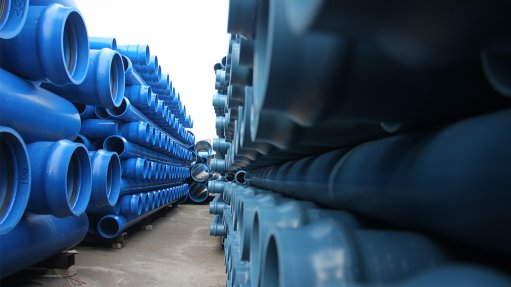
IN THE PIPELINE The laying of permanent pipelines using high-quality, plastic water pipes can offer a guaranteed water supply as opposed to current quick-fixes
Government’s present efforts to address the lack of potable water in remote areas are resulting in industries that could offer long-term solutions being overlooked, says Southern African Plastic Pipe Manufacturers Association (Sappma).
“Understandably, the need to supply to areas that are without water is paramount because of the Covid-19 pandemic,” says Sappma CEO Jan Venter.
However, he suggests that the about R300-million used by the Department of Water and Sanitation (DWS) in the past few months to provide supply to these areas is a short-term solution.
This includes the procurement of about 17 000 plastic water tanks, presumably to supply vulnerable communities with clean water to allow for regular hand washing as a means of preventing the spreading of the virus.
Speaking on behalf of the South African plastic pipe industry, the association regards this as wasteful expenditure, says Venter.
“Apart from the fact that many of the water tanks that were delivered were leaking water and were empty only a few days after they had been installed, inferior quality water tanks are only an interim, short-term solution.”
He attributes this to a lack of long-term planning and effective execution, as well as a lack of technical skills.
Venter tells Engineering News that a possible option in this regard is using high-quality, plastic water pipes for a pipeline, which can offer a guaranteed water supply – source dependent – for at least 50 years.
Sappma is concerned about the vulnerable, rural communities that desperately need a consistent, reliable supply of clean water for drinking, cooking and daily hygiene, he adds.
Consequently, the association feels it is vital to educate the DWS and the decision-makers within municipalities about the significance of using high-density polyethylene and polyvinyl chloride pipes that bear the Sappma mark of quality.
Both these materials are suitable for water or sewage transportation.
“Production capacity is available and so are installation facilities; therefore, it need not take long to get workable projects completed,” says Venter.
The association also encourages that pipe installations are done only by a company that is a member of the Installation and Fabrication Plastics Pipe Association.
Venter stresses that South Africa is facing a stark new reality of “life after lockdown”, as the Covid-19 outbreak forced companies to shut down their operations for five weeks. As pipe manufacturers have now been allowed to resume their operations, many of them have to do so with a reduced workforce and a negatively impacted cash flow.
“In addition, there is concern about the wellbeing of the construction industry, with which the pipe business is closely linked,” he reiterates.
He advises manufacturers to ensure that the business does not carry unnecessary costs, and that staff effectiveness is maximised at all levels.
“The only viable long-term strategy to get through this situation is to always provide the best possible customer service and only top-quality products,” concludes Venter.